Read & Listen
How AI is Transforming Business and Innovation
-
 From Hesitation to Innovation: How Maine Businesses are Overcoming AI Fears
From Hesitation to Innovation: How Maine Businesses are Overcoming AI FearsFears about cost, complexity and unknown risks can hold back small businesses, but artificial intelligence tools are simpler and more affordable than many think.
-
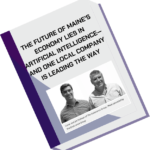 The Future of Maine’s Economy Lies in Artificial Intelligence—And One Local Company is Leading The Way
The Future of Maine’s Economy Lies in Artificial Intelligence—And One Local Company is Leading The WayMaine’s economy has always been defined by resilience and ingenuity. Now, as artificial intelligence (AI) transforms industries worldwide, the state faces a critical opportunity to harness this powerful technology. The Endurance Group (TEG), a family-owned business in Portland, is leading the charge to help local companies embrace AI and secure their place in an increasingly tech-driven world.
-
 The New Language of Business: How an AI-Literate Workforce is the New Competitive Advantage
The New Language of Business: How an AI-Literate Workforce is the New Competitive AdvantageThe integration of generative AI is no longer an option for businesses but a necessity. Gen AI can help companies accelerate high-quality content production, gain new insights, scale personalized customer outreach, and enhance overall communication quality. The introduction of gen AI isn’t just a technological upgrade. It’s a fundamental shift in how employees communicate and how businesses operate. It’s the new language of business.
-
 The Next Generation of Sales AI in 2025
The Next Generation of Sales AI in 2025AI is revolutionizing the sales landscape by allowing professionals to move up the value chain, shifting from manual, repetitive tasks to more strategic and value-driven work. With AI handlingtime- consuming activities like response generation, information gathering, and personalized interactions, sales teams are free to focus on building relationships and driving meaningful conversations with prospects. Now, more than ever, it’s clear that AI is not here to take your job, especially if you embrace it. Becoming an AI power user is a surefire path to success in today’s world.”
-
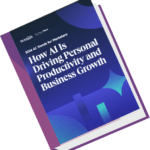 How AI Is Driving Personal Productivity and Business Growth
How AI Is Driving Personal Productivity and Business GrowthThere’s no denying it—last year posed a lot of hurdles for marketers. Financial instability and restructuring seemed to be common themes for businesses everywhere, regardless of industry. But marketers didn’t shy away from the challenges facing their teams. In fact, they were more resilient than ever.
-
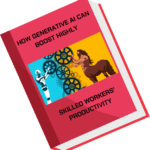 How Generative AI can Boost Highly Skilled Workers’ Productivity
How Generative AI can Boost Highly Skilled Workers’ ProductivityGenerative AI can boost worker productivity, but organizations must first establish a culture of accountability, reward peer training, and encourage role reconfiguration. A new study on the impact of generative AI on highly skilled workers finds that when artificial intelligence is used within the boundary of its capabilities, it can improve a worker’s performance by as much as 40% compared with workers who don’t use it.
-
 Addressing the AI in MAIne
Addressing the AI in MAIneWhen ChatGPT was released in November of 2022, it felt like the world would change. A powerful technology, generative artificial intelligence (GAI), emerged beneath our fingertips. GAI is a subset of artificial intelligence (AI) technology that allows users to rapidly create new content in multimodal formats with simple commands. ChatGPT, a popular GAI product, promised to fill our workdays with less drudgery and more productivity. ChatGPT largely delivered on this promise, streamlining to-do lists.
-
 300% More Efficient: The Endurance Group Accelerates with AI
300% More Efficient: The Endurance Group Accelerates with AIThe Endurance Group started out as an outsourced sales and marketing company for professional services firms, consultants, and insurance and accounting companies. 20 years ago, when Conor Sullivan’s father founded the group, the emphasis was mostly on cold calling. But as technology and sales strategies evolved, so has The Endurance Group. Now, they’re leveraging AI to help clients reach their key prospects and even create their own AI solutions.
-
 The State of AI in Maine
The State of AI in MaineLike any groundbreaking technology, AI offers opportunities but often overlooks major challenges and is surrounded by hype. This report by the Institute of Experiential AI (EAI) at Northeastern University highlights key AI advancements in Maine and what sets the state apart in its innovative uses of technology.
-
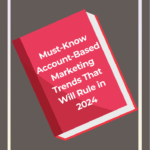 Must-Know Account-Based Marketing Trends That Will Rule in 2024
Must-Know Account-Based Marketing Trends That Will Rule in 2024Account-based marketing (ABM), as outlined by this piece in Gartner, is transforming the B2B marketing arena by concentrating on high-value accounts instead of a broad audience. This strategy allows marketing and sales teams to customize their messaging to meet the specific needs of target accounts, resulting in higher engagement and conversion rates. Emerging trends in ABM for 2024 include the use of AI-driven tools, the application of intent data for hyper-personalization, and fostering strong alignment between sales and marketing teams to drive efficient growth and improve customer retention.
-
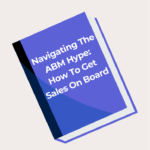 Navigating The ABM Hype: How To Get Sales On Board Forbes Agency Council
Navigating The ABM Hype: How To Get Sales On Board Forbes Agency CouncilAccount-based marketing (ABM), as explained by this article in Forbes, is a targeted strategy that focuses on key accounts with personalized campaigns, significantly enhancing engagement and conversion rates. To successfully implement ABM, it's crucial to align with sales teams, fostering trust and collaboration by sharing valuable insights and establishing fair success metrics. Key types of ABM include strategic, ABM lite, and programmatic, each with varying levels of personalization, but all requiring a strong data foundation to tailor messaging and drive meaningful connections with target accounts.
-
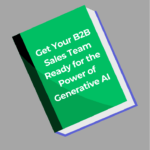 Get Your B2B Sales Team Ready for the Power of Generative AI
Get Your B2B Sales Team Ready for the Power of Generative AIGenerative AI (GenAI), as outlined by BCG, is set to revolutionize B2B sales by significantly enhancing the productivity and effectiveness of sales teams. By integrating GenAI personas—such as a sales assistant, data scientist, personal marketer, and sales coach—organizations can streamline tasks, personalize outreach, and provide data-driven insights, ultimately boosting revenue growth. Key to successful GenAI implementation is building trust with sales teams, focusing on overall effectiveness rather than efficiency alone, and viewing GenAI as new team members that require training and gradual integration.
-
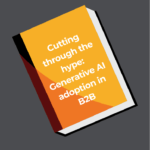 Cutting through the hype: Generative AI adoption in B2B
Cutting through the hype: Generative AI adoption in B2BGenerative AI (GenAI), as detailed by Bain & Company, is empowering B2B sales and marketing leaders to achieve superior outcomes by deploying AI at scale. Leading companies are leveraging GenAI to enhance their go-to-market strategies, boost commercial excellence, and drive revenue growth. Key to successful implementation is integrating GenAI into existing processes, focusing on strategic applications, and continuously refining the AI models with high-quality data to maintain a competitive edge in a rapidly evolving business landscape.
-
 How Generative AI Will Change Sales
How Generative AI Will Change SalesGenerative AI (GenAI) is set to transform sales by automating administrative tasks, enhancing customer interactions, drafting personalized emails, generating insights, providing recommendations, and aiding sales managers, according to a Harvard Business Review article. Successful implementation requires seamless integration into sales processes, fine-tuning with specific data, and support from AI-savvy personnel. To realize value quickly and control costs, companies should integrate GenAI into existing systems and strategically outsource capabilities. As digital self-service and e-commerce grow, AI will enable salespeople to focus on complex, customized tasks.
Cutting-Edge Tactics to Accelerate Growth and Build Lasting Partnerships
-
 The Comprehensive Guide to Account-Based Sales for 2024
The Comprehensive Guide to Account-Based Sales for 2024Account-based selling (ABS), as detailed by our partner HubSpot, is a strategic approach where a dedicated team targets multiple stakeholders within a prospective customer's company, treating each account as a market of one. This model, ideal for enterprise sales, involves cross-department coordination, including Sales, Marketing, and Customer Success, to deliver a personalized experience and foster long-term relationships. Key components of ABS include defining an ideal customer profile (ICP), creating targeted content, and tracking metrics like average contract value and lifetime value to ensure success.
-
 Innovation and Social Capital in Organizational Ecosystems
Innovation and Social Capital in Organizational EcosystemsThe author works within a corporate organization and critically evaluates the development of effective and valuable business relevant personal relationships and networks. Although this may not appear on balance sheets, they can have a significant impact on the bottom line – such relationships may even be an organization's unique selling point (USP) in its environment.
-
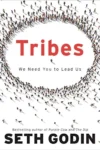 Tribes: We Need You to Lead Us
Tribes: We Need You to Lead UsSeth Godin's visionary book has helped tens of thousands of leaders turn a scattering of followers into a loyal tribe. If you need to rally fellow employees, customers, investors, believers, hobbyists, or readers around an idea, this book will demystify the process. It's human nature to seek out tribes, be they religious, ethnic, economic, political, or even musical (think of the Deadheads). Now the Internet has eliminated the barriers of geography, cost, and time.
-
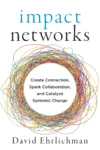 Impact Networks: Create Connection, Spark Collaboration, and Catalyze Systemic Change
Impact Networks: Create Connection, Spark Collaboration, and Catalyze Systemic ChangeThe social and environmental challenges we face today are not only complex, they are also systemic and structural and have no obvious solutions. They require diverse combinations of people, organizations, and sectors to coordinate actions and work together even when the way forward is unclear. Collaborative efforts often fail because they attempt to navigate complexity with traditional strategic plans.
-
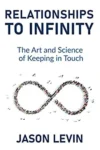 Relationships to Infinity: The Art and Science of Keeping in Touch
Relationships to Infinity: The Art and Science of Keeping in TouchHave you ever felt awkward wanting to reach out to a friend or colleague you haven’t spoken to in a while, so you didn’t reach out? Do you feel like your networking skills appear disingenuous but come authentically to everyone else? Relationships to Infinity: The Art and Science of Keeping in Touch is both a social science-based and practical guide to helping you get better at keeping in touch.
-
 Building Social Capital When You Work Remotely
Building Social Capital When You Work RemotelyWhile social capital has always been integral to collaboration at work, it is essential for every hybrid and remote employee and for solo entrepreneurs. Since this work has rendered many of these employees less visible, it has become non-negotiable for these employees to invest in their own interpersonal relationships. Just like any other currency, social capital can be earned, invested and spent.
-
 Network effects: How to rebuild social capital and improve corporate performance
Network effects: How to rebuild social capital and improve corporate performancePeople’s professional networks have shrunk since the onset of the COVID-19 pandemic, while companies’ attrition and hiring challenges are growing. To help reverse these trends, people and organizations will need to manage workplace interactions more intentionally. Here’s how.
-
 Who You Know: Unlocking Innovations That Expand Students' Networks
Who You Know: Unlocking Innovations That Expand Students' NetworksRelationships matter. Who You Know explores this simple idea to give teachers and school administrators a fresh perspective on how to break the pattern of inequality in American classrooms. It reveals how schools can invest in the power of relationships to increase social mobility for their students.
-
 Social Capital Is Your Most Valuable Asset: Here's How To Build It On An Individual And Team Level
Social Capital Is Your Most Valuable Asset: Here's How To Build It On An Individual And Team LevelSometimes, it’s not what you know but who you know—a saying that has withstood the test of time and still rings true today. Discerning entrepreneurs know their success would not have materialized without strategic connections, shared lessons and knowledge.
-
 Never Eat Alone, Expanded and Updated: And Other Secrets to Success, One Relationship at a Time
Never Eat Alone, Expanded and Updated: And Other Secrets to Success, One Relationship at a TimeMaster networker, Keith Ferrazzi, claims it is reaching out to other people. What distinguishes highly successful people from everyone else is the way they use the power of relationships.
-
 Measuring Social Capital: Can We Tell If Some Places Are Richer in Social Capital Than Others?
Measuring Social Capital: Can We Tell If Some Places Are Richer in Social Capital Than Others?The concept of social capital has been inconsistently defined and described.That should not be surprising, given that social capital is intangible and not easily measured. At root, social capital is about the value of relationships—to people and institutions. Given the slipperiness of the concept, it is reasonable to ask whether we can measure social capital.
Podcasts
Unlock your Social Capital now
Discover how you can close more deals and make genuine connections


